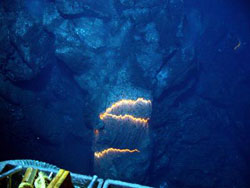Deep-sea volcanoes don't just produce lava flows, they also explode!

This images shows bands of glowing magma from submarine volcano. Credit: NOAA/National Science Foundation<br>
Between 75 and 80 per cent of all volcanic activity on Earth takes place at deep-sea, mid-ocean ridges. Most of these volcanoes produce effusive lava flows rather than explosive eruptions, both because the levels of magmatic gas (which fuel the explosions and are made up of a variety of components, including, most importantly CO2) tend to be low, and because the volcanoes are under a lot of pressure from the surrounding water.
Over about the last 10 years however, geologists have nevertheless speculated, based on the presence of volcanic ash in certain sites, that explosive eruptions can also occur in deep-sea volcanoes.
But no one has been able to prove it until now.
By using an ion microprobe, Christoph Helo, a PhD student in McGill's Department of Earth and Planetary Sciences, has now discovered very high concentrations of CO2 in droplets of magma trapped within crystals recovered from volcanic ash deposits on Axial Volcano on the Juan de Fuca Ridge, off the coast of Oregon.
These entrapped droplets represent the state of the magma prior to eruption. As a result, Helo and fellow researchers from McGill, the Monterey Bay Aquarium Research Institute, and the Woods Hole Oceanographic Institution, have been able to prove that explosive eruptions can indeed occur in deep-sea volcanoes. Their work also shows that the release of CO2 from the deeper mantle to the Earth's atmosphere, at least in certain parts of mid-ocean ridges, is much higher than had previously been imagined.
Given that mid-ocean ridges constitute the largest volcanic system on Earth, this discovery has important implications for the global carbon cycle which have yet to be explored.
For an abstract of the article: http://www.nature.com/ngeo/journal/vaop/ncurrent/full/ngeo1104.html
Media Contact
All latest news from the category: Earth Sciences
Earth Sciences (also referred to as Geosciences), which deals with basic issues surrounding our planet, plays a vital role in the area of energy and raw materials supply.
Earth Sciences comprises subjects such as geology, geography, geological informatics, paleontology, mineralogy, petrography, crystallography, geophysics, geodesy, glaciology, cartography, photogrammetry, meteorology and seismology, early-warning systems, earthquake research and polar research.
Newest articles

Machine learning algorithm reveals long-theorized glass phase in crystal
Scientists have found evidence of an elusive, glassy phase of matter that emerges when a crystal’s perfect internal pattern is disrupted. X-ray technology and machine learning converge to shed light…

Mapping plant functional diversity from space
HKU ecologists revolutionize ecosystem monitoring with novel field-satellite integration. An international team of researchers, led by Professor Jin WU from the School of Biological Sciences at The University of Hong…

Inverters with constant full load capability
…enable an increase in the performance of electric drives. Overheating components significantly limit the performance of drivetrains in electric vehicles. Inverters in particular are subject to a high thermal load,…





















